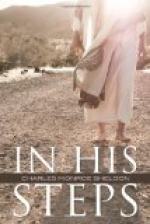The Rev. Calvin Bruce, D. D., of the Nazareth Avenue Church, Chicago, let his pen fall on the table. He had come to the parting of the ways, and his question, he felt sure, was the question of many and many a man in the ministry and in the church. He went to his window and opened it. He was oppressed with the weight of his convictions and he felt almost suffocated with the air in the room. He wanted to see the stars and feel the breath of the world.
The night was very still. The clock in the First Church was just striking midnight. As it finished a clear, strong voice down in the direction of the Rectangle came floating up to him as if borne on radiant pinions.
It was a voice of one of Gray’s old converts, a night watchman at the packing houses, who sometimes solaced his lonesome hours by a verse or two of some familiar hymn:
“Must Jesus bear the
cross alone
And all the world go
free?
No, there’s a
cross for every one,
And there’s a
cross for me.”
The Rev. Calvin Bruce turned away from the window and, after a little hesitation, he kneeled. “What would Jesus do?” That was the burden of his prayer. Never had he yielded himself so completely to the Spirit’s searching revealing of Jesus. He was on his knees a long time. He retired and slept fitfully with many awakenings. He rose before it was clear dawn, and threw open his window again. As the light in the east grew stronger he repeated to himself: “What would Jesus do? Shall I follow His steps?”
The sun rose and flooded the city with its power. When shall the dawn of a new discipleship usher in the conquering triumph of a closer walk with Jesus? When shall Christendom tread more closely the path he made?
“It is the way the Master trod; Shall not the servant tread it still?”
Chapter Twenty-one
“Master, I will follow Thee whithersoever Thou goest.”
The Saturday afternoon matinee at the Auditorium in Chicago was just over and the usual crowd was struggling to get to its carriage before any one else. The Auditorium attendant was shouting out the numbers of different carriages and the carriage doors were slamming as the horses were driven rapidly up to the curb, held there impatiently by the drivers who had shivered long in the raw east wind, and then let go to plunge for a few minutes into the river of vehicles that tossed under the elevated railway and finally went whirling off up the avenue.
“Now then, 624,” shouted the Auditorium attendant; “624!” he repeated, and there dashed up to the curb a splendid span of black horses attached to a carriage having the monogram, “C. R. S.” in gilt letters on the panel of the door.
Two girls stepped out of the crowd towards the carriage. The older one had entered and taken her seat and the attendant was still holding the door open for the younger, who stood hesitating on the curb.




